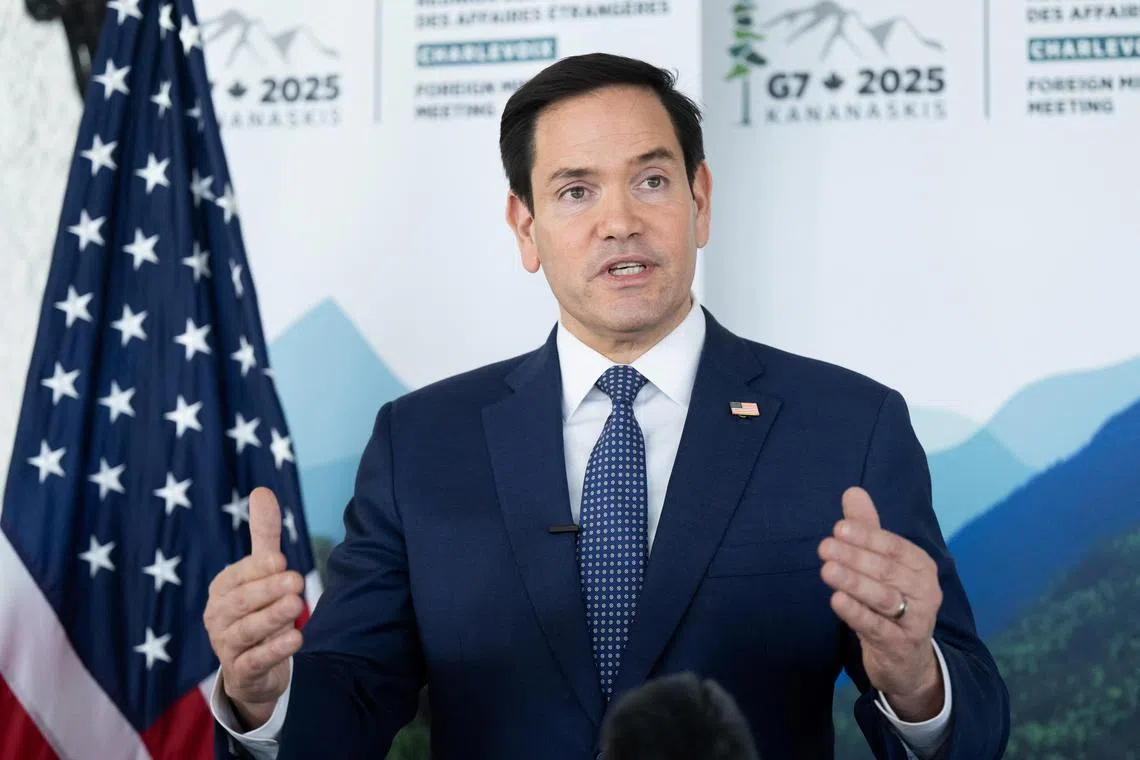US hits Thai officials with visa sanctions over deportation of Uighurs to China
Sign up now: Get insights on Asia's fast-moving developments

US Secretary of State Marco Rubio speaks to reporters following a Group of Seven foreign ministers' meeting in Canada on March 14.
PHOTO: REUTERS
Follow topic:
WASHINGTON - US Secretary of State Marco Rubio on March 14 announced sanctions against officials from Thailand, a US ally, for their role in deporting at least 40 Uighurs to China
The US is “committed to combating China’s efforts to pressure governments to forcibly return Uighurs and other groups to China, where they are subject to torture and enforced disappearances”, the State Department said in a statement.
The move appeared to be intended to discourage Thailand and other countries from such deportations.
While the US has imposed sanctions in the past on Thailand, including by suspending military aid after military coups, and has targeted Thai individuals and companies for violating sanctions on third countries, a leading South-east Asia expert said he could not recall sanctions on government officials, who were not named in Mr Rubio’s announcement.
Thailand’s February deportation of the Uighurs, held in detention for a decade, came despite warnings from UN human rights experts that they were at risk of torture, ill-treatment and “irreparable harm” if returned.
Reuters reported earlier in March that Canada and the US offered to resettle 48 ethnic Uighurs, but Bangkok feared upsetting China.
“I am immediately implementing this policy by taking steps to impose visa restrictions on current and former officials for the government of Thailand responsible for, or complicit in, the forced return of 40 Uighurs from Thailand on Feb 27,” Mr Rubio said.
“In light of China’s longstanding acts of genocide and crimes against humanity committed against Uighurs, we call on governments around the world not to forcibly return Uighurs and other groups to China,” Mr Rubio said.
The restrictions could extend to family members of people sanctioned, the statement added.
Thailand responded on March 15 that it had received reassurances from China “over the safety of the Uighurs and will continue to follow up on the well-being of this group”.
“Thailand has always upheld a long tradition of humanitarianism, particularly in providing assistance to displaced persons,” the Thai Foreign Ministry said, adding that it values its “longstanding and close treaty alliance with the US”.
This week, the European Parliament also condemned Thailand over the deportations, calling on the EU to use free trade agreement negotiations as leverage to stop future such moves.
Mr Murray Hiebert, an expert with the South-east Asia programme at Washington’s Centre for Strategic and International Studies, said he could not recall past US sanctions against Thai government officials.
He said Thailand can be sensitive to criticism, but its reaction could be tempered by President Donald Trump’s tariff threats against countries that have large trade surpluses with Washington.
“They might want to lie low,” he said. “They already have a target on their back by having the 11th-largest trade surplus with the US... It’s not clear Thailand is out of the woods yet when Mr Trump imposes reciprocal tariffs in early April.”
Analysts say Washington had avoided taking tougher measures against Thailand in the past due to concerns that this might push its long-time ally closer to China.
The Washington-based Campaign for Uighurs advocacy group commended Mr Rubio’s move and the Trump administration in a statement, saying it “sends a strong message that those who enable the Chinese Communist Party’s human rights abuses will face consequences for their crimes”.
Mr Rubio, who was a staunch advocate for Uighurs when he served as a US senator, has reiterated that Beijing’s treatment of the group had amounted to “genocide and crimes against humanity”, a designation the US first made in the waning hours of Mr Trump’s first term in 2021.
China denies allegations of abuse and forced labour towards Uighurs, arguing it has established “vocational training centres” in recent years to curb terrorism, separatism and religious radicalism. REUTERS

